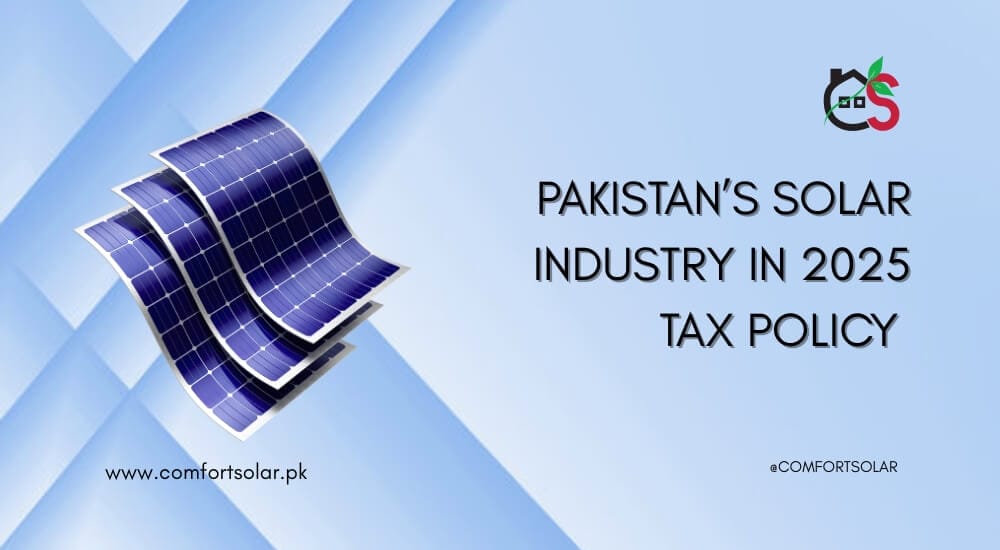
- 0316 622 5526
- Comfort Solutions Pvt Limited
Account

Pakistan’s rooftop and off-grid solar energy sector has grown rapidly, with net-metered capacity nearly quadrupling from 2024 to 2025. However, new tax policies and regulations introduced in the FY2025–26 federal budget may reshape this trajectory. The imposition of an 18% General Sales Tax (GST) on imported solar panels and stricter quality testing have sparked widespread discussion among consumers, solar companies, and policymakers. Here’s a complete breakdown of what these changes mean for Pakistan’s solar future.

Impact: The tax raises the price of imported panels by 18%, which could result in a 10–15% increase in system costs for end consumers. Middle-income families, who have adopted solar to avoid high grid tariffs, may now delay or cancel installations.
Following significant public and parliamentary pressure, the federal government has officially announced a reduction in the General Sales Tax (GST) on imported solar panels from 18% to 10%.
This decision, revealed after Senate committee recommendations and widespread consumer backlash, aims to strike a balance between fiscal reform and solar affordability.
Implications:
A moderate relief for consumers and solar installers
Renewed optimism in the solar market
Still higher prices than in 2024, but more manageable than under 18% GST

The 18% GST aligns with the IMF’s pressure to broaden Pakistan’s tax base. The IMF explicitly encouraged the government to remove sector-based tax exemptions, including those for solar panels. While this supports fiscal consolidation, it may discourage investments in clean energy and create uncertainty in the solar market.
While the tax policy is meant to protect local industry, domestic solar panel production is still in its infancy:
Reality Check: Most solar panels in Pakistan are still imported. Domestic production isn’t yet robust enough to meet demand or offer competitive prices.
To protect against low-quality, substandard panels, the government now enforces mandatory certification for all imported PV modules:
Goal: Ensure compliance with international IEC standards, increase safety, and prevent black-market equipment. However, delays or bureaucratic hurdles at inspection labs could increase project timelines and costs.

Higher Costs:
Slower Growth:
Uncertain Future:
High, fixed tariffs may reduce investor and consumer confidence.
Pakistan’s solar industry stands at a crossroads. If the final import tax is reduced or removed, the country can maintain strong solar adoption and meet climate goals. If not, growth may stall, and energy inequality may rise.
Key Takeaways:
Outlook:
If the Senate adjusts the tax to a more reasonable level (e.g., 10%), Pakistan could continue its solar surge, lower power outages, and reduce grid dependence — all while slowly growing its local manufacturing base.
Ready to power your home with affordable, clean energy? Contact Comfort Solar today for a free solar system consultation and quotation tailored to your needs.
WhatsApp us